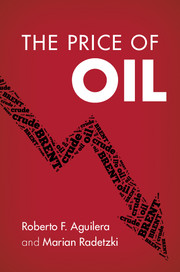Book contents
- Frontmatter
- Contents
- Figures
- Tables
- Acknowledgments
- 1 Introduction and overview
- PART I OIL'S EXTRAORDINARY PRICE HISTORY: HOW CAN IT BE EXPLAINED?
- PART II THE SHALE AND CONVENTIONAL OIL REVOLUTIONS: LOW PRICES AHEAD
- PART III GLOBAL IMPLICATIONS FOR THE MACROECONOMY, THE ENVIRONMENT AND FOR POLITICS
- 13 Impact on macroeconomy and trade balances
- 14 Climate policy with low oil prices
- 15 Political repercussions
- CONCLUSIONS
- References
- Index
15 - Political repercussions
from PART III - GLOBAL IMPLICATIONS FOR THE MACROECONOMY, THE ENVIRONMENT AND FOR POLITICS
Published online by Cambridge University Press: 05 November 2015
- Frontmatter
- Contents
- Figures
- Tables
- Acknowledgments
- 1 Introduction and overview
- PART I OIL'S EXTRAORDINARY PRICE HISTORY: HOW CAN IT BE EXPLAINED?
- PART II THE SHALE AND CONVENTIONAL OIL REVOLUTIONS: LOW PRICES AHEAD
- PART III GLOBAL IMPLICATIONS FOR THE MACROECONOMY, THE ENVIRONMENT AND FOR POLITICS
- 13 Impact on macroeconomy and trade balances
- 14 Climate policy with low oil prices
- 15 Political repercussions
- CONCLUSIONS
- References
- Index
Summary
Before venturing into the subject proper of this chapter, it may be instructive to repeat some of the conclusions to which the analysis of earlier chapters has led, and to point out how these conclusions differ from concurrent conventional wisdom when the latter has been recorded. Projections of supply volumes, prices and the geography of supply are considered.
In Chapter 11, our reference scenario concluded that the shale revolution would yield an increased output of oil in the world (outside the US) totaling 19.5 mbd in the 20 years between 2015 and 2035. We also asserted that the conventional revolution – the application of horizontal drilling and fracking to conventional oil deposits in the world outside the US – would yield a further addition to output of 19.7 mbd in the same period, summing up to a spectacular total rise of over 39 mbd by 2035. This equals almost half of global oil output in 2014, is nearly twice as much as the global increase in all oil production in the 20-year period 1994–2014, and is close to one-third greater than OPEC's output in 2014.
Our number, 39 mbd, is an extreme outlier compared with the projections of conventional analysts. BP (2015) envisions a global increase in oil supply of 12.8 mbd over the 20-year period in focus, IEA (2014a) visualizes a rise for the period beginning in 2013 at no more than 13.4 mbd, while EIA (2014b) assesses the increase for the somewhat longer period from 2011 to 2035 at 19.3 mbd. Comparing these global assessments with our projection, it should be added that our numbers have disregarded all production rises in the US as well as the plausible increases in conventional oil exploitation employing traditional extraction methods in the world outside the US, such as the projected impressive increase in Iraqi output, from 3.0 mbd in 2012 to 7.9 mbd in 2035 (IEA, 2013b).
Our reference case conclusion on prices in Chapter 12 sees a fall of some $40/bl between 2015 and 2035, from around $100 (the approximate average oil price from 2011 through 2014) down to a level of about $60 in 2035. Meanwhile, EIA and IEA expect prices by 2035 to have risen to $130 and $128, respectively.
- Type
- Chapter
- Information
- The Price of Oil , pp. 200 - 210Publisher: Cambridge University PressPrint publication year: 2015



